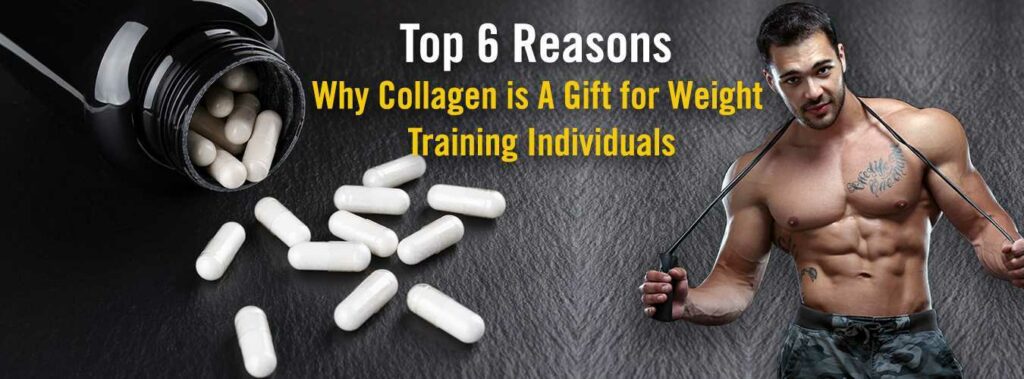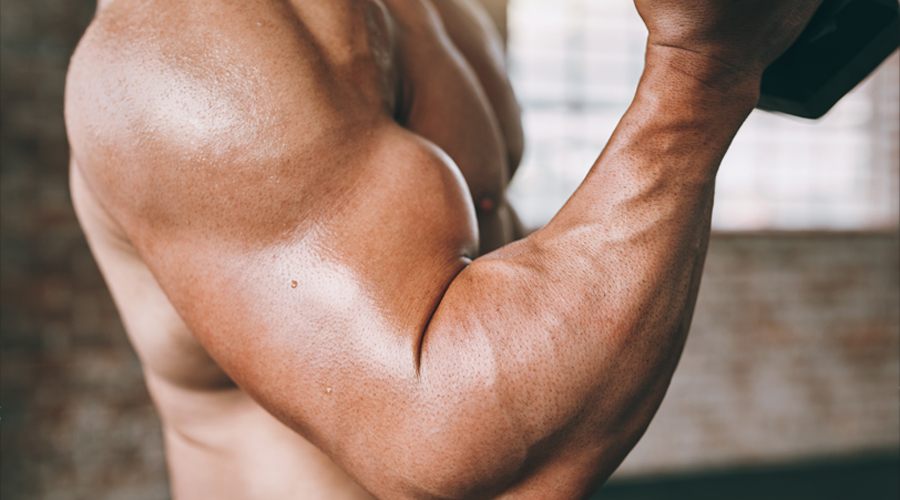Top 6 Reasons Why Collagen is A Gift for Weight Training Individuals
9 March 2023
You might have come across the buzzword collagen a lot and heard a lot about its various benefits for skin, hair and nails. This article explains how collagen supplements are good for those undergoing weight training and how it helps in muscle building.
Collagen is a popular supplement and for all good reasons. It is considered to be a wonder element for skin and hair and is used in various beauty products and regimes. But, what if we told you that collagen works wonder for your muscles? Get back the jaw you dropped just now and read the post to know more about this wonder supplement.
What is collagen?
It is a primary structural protein that is found in the tendons, ligaments, muscles, bones, vasculature, cartilage, skin and the GI system of the human body. This is the heaviest protein found in your body, which makes up 35% of the total protein content in your body.
The term ‘collagen’ is derived from a Greek word which means ‘glue’. Collagen, in fact, acts as an adhesive that binds your body together. Collagen is made up of conditionally essential amino acids which are proline, glycine, and arginine. Conditionally essential amino acids are those which your body produces, what you need to intake is the essential amino acids, as your body cannot produce the on its own. This is one of the reasons why collagen supplements are enjoying exploding popularity.
A total of 29 types of collagen are discovered to date. Out of these, type I, II and III are majorly found in the human body.
There are enough researches that state that collagen positively affects the quality of the skin and helps reduce wrinkles. It also improves the health of hair and nails. Collagen has also known to be helpful in reducing joint pain.
Nowadays you can find widespread use of collagen in various functional foods like protein bars, baked goods, etc. The fitness industry has been marketing collagen on the claim that it helps in muscle building. Is this claim true? Let’s understand.
The functioning of collagen supplements
Be it collagen, whey protein or any other form of protein, upon ingestion, they are digested and broken into individual amino acids by the enzymes of the GI tract. When these reach the small intestine, they are transferred to the bloodstream and move further to the liver.
Those amino acids that the liver is unable to use, are discharged again into the bloodstream where they are used by the body to perform a variety of functions such as:
- Muscle growth and recovery
- Repairing of cells
- Improving appearance and health of skin, hair, and nails
- Production of hormones
- Enhance joint integrity
- Neurotransmitter synthesis
The reason behind the stark popularity of collagen supplements is that when we age, our natural collagen production rate declines. Consuming collagen supplements can help in providing our body with the required amino acids to enhance collagen production.
Amino acids in collagen
Collagen is made up of various amino acids. Out of these various amino acids, 3 are main:
- Glycine
- Proline
- Hydroxyproline
Hydroxyproline is not found in good quantity in a majority of foods that people normally consume. Collagen offers the human body this vital amino acid. Collagen’s unique composition of amino acids helps in muscle building.
To lose weight or form big muscles, weight training is very important. It gives your muscles strength and helps in burning body fat. Collagen is said to be helpful in building muscles and thus helping those who are undergoing weight training.
Let’s dig deeper to find out the actual deal.
Collagen for muscle building and weight training individuals
Collagen is the main component providing structural support to your body. It is present in 90% of the connective tissues. The high bioavailability and high amino acid profile of collagen labels it as great post-workout nutrition which is absorbed quickly and repairs and replenishes the proteins that break down while working out.
- Collagen helps in muscle repairing and restoration: When you work out for longer durations, your muscles lose protein because of oxidation, muscle microlesions, and inflammatory reactions. There are various researches that show that while exercising, protein synthesis reduces and increases quickly post-workout for an extended time period. Consuming a high-protein diet after a workout helps to restore the lost proteins in muscles by increasing muscle anabolism. Collagen has a great amino acid content and thus it qualifies for muscle repairing and recovery.
- Collagen might help in speeding up recovery time: Regeneration of muscle fibers along with the generation of connective scar tissue are the two main factors that lead to the healing of torn and ruptured muscles. For these two factors to happen, collagen formation is very important. A study was conducted to measure the rates of collagen production for 3 weeks after a muscle tear. The researchers found that collagen synthesis rates were raised in muscle cells during that time. During the first week of the healing of muscle tear, Type III collagen synthesis was at its highest. It is in connection with the development of flexibility of the connective tissue. As and when the healing process went further, Type I collagen started forming and was linked to enhanced strength of the newly formed muscle fibers and connective tissues.
- Collagen can help in preventing injuries by providing strength to joints, bones, and ligaments: When you perform weighted movements, like lifting heavy weights, the pressure is generated on your joints. This might sometimes invite injuries. You need strong bones and joints to avoid injuries. A study conducted on three distinct category athletes showed that supplements when combined with collagen peptides, arginine, and BCAA over a course of 2 years, minimized tendon-ligament and joint injury rates. One more study to measure the effect of regular collagen peptides intake on the Achilles tendon structure was conducted. It was discovered that there was an evident rise in collagen fiber diameter, indicating enhanced tendon strength due to supplementing collagen. So, people doing weight training can experience a certain level of ease while lifting heavyweights.
- Collagen can be helpful in reducing joint pains that are connected to sports-related injuries: Getting involved in weightlifting, doing heavy-duty weight exercises, etc. or being involved in various sports or intense workouts can lead to joint pain. Various studies have proven that collagen might be helpful in reducing joint pain arising due to exercises or other intense physical activities. Collagen supplements help in enhancing joint functions and improve flexibility while working out.
- Collagen is helpful in enhancing natural creatine production: When you are doing heavy lifting in the gym, your muscles lookup to a fast and instantly available source of energy, which is available in the form of ATP (Adenosine Triphosphate). It is a chemical substance that requires creatine to be present in order to exist. To generate creatine you require glycine, methionine, and arginine. These three are amino acids out of which collagen contains arginine and glycine in a huge amount. That is why collagen can have a positive impact on creatine and eventually ATP production. Higher the ATP levels, more will be your muscle energy and you will see a difference in your workout capacity at the gym.
- Collagen helps in enriching muscles with nutrients: Arginine present in collagen helps in enhancing blood flow in the body. It is known as a vasodilator, i.e., it aids in relaxing and broadening the blood vessels. When the blood vessels increase in size, your muscles get more amount of oxygen and other essential nutrients. This helps in muscle recovery. For weight training individuals, it is extremely helpful as it helps muscle recovery after an injury or overexertion. It also relaxes the tired muscles you get after heavy workouts.
Collagen has various benefits to offer to bodybuilders and people undergoing weight training. But if you are looking to entirely shift to collagen for all your protein needs, hold back. Collagen has a unique amino acid profile but misses out on one of the 9 essential amino acids. It can be taken in combination with protein supplements such as whey protein and a healthy and nutrient-rich diet.
Huge muscles are always a result of diet, exercise, and supplements combined. MuscleBlaze recommends that you should keep working out and don’t forget to eat healthy and workout along with consuming supplements like collagen.









 100% Safe & Secure payments:
100% Safe & Secure payments:




